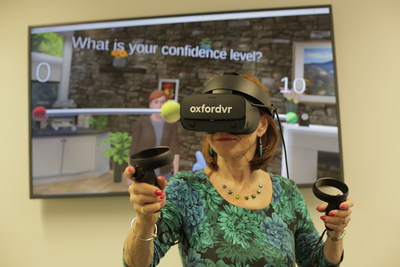Oxford VR Launch Social Engagement™ – a First-in-class Digital Therapeutic Using Virtual Reality Technology to Tackle Anxious Social Avoidance

OXFORD, England, March 10, 2020 /PRNewswire/ — Oxford VR (OVR) announces the launch of OVR social engagement™ a ground-breaking and progressive behavioral health intervention using virtual reality technology to help individuals overcome anxious social avoidance, prevalent in multiple mental health conditions including agoraphobia, panic disorder, social anxiety, depression, personality disorders, and schizophrenia.
Founded in 2017, Oxford VR’s work is at the frontiers of exciting innovation in behavioral healthcare using powerful virtual reality technology and evidence-based science to improve capacity and outcomes. The company creates automated immersive psychological therapy interventions that build on 20 years of clinical research by Daniel Freeman, Professor of Clinical Psychology at the Department of Psychiatry, Oxford University.
Anxious social avoidance is a major unmet need in mental healthcare. It is one of the most debilitating features of a mental illness. Individuals experience extreme distress and fear in public situations – especially when alone – such as going outside, using public transport, or being in a supermarket. For some, it can progress to a point of social isolation and affect overall health in a way that is comparable to the impact of obesity and cigarette smoking.[1]
Anxious social avoidance is also common in individuals with addiction and substance abuse issues. In severe and complex mental health conditions such as schizophrenia, anxious social avoidance leading to isolation is frequently seen.[2] Studies show that women are more likely than men to experience anxious social withdrawal.[3]
Developed by OVR clinicians, OVR social engagement™ is a user-centred program that translates evidence-based cognitive-behavioural therapy (CBT) through immersive virtual reality environments.
OVR social engagement™ is delivered over half-hour weekly sessions. During a session, the user puts on a VR headset and enters a virtual world where they are guided by a virtual coach and have to complete a series of tasks, graded in difficulty in different environments such as a street scene, a bus, and a shop – reflecting the everyday triggers of anxious social avoidance. Great care has been made to ensure the environments are life-like, interactive, and engaging.
Throughout the program the user gradually faces problematic situations to overcome extreme distress and fear to feel safer, more confident and more in control. The program is automated and does not require a qualified clinician and can be delivered by a trained member of staff.
The VR environments give people the reassurance they can try out new things safely. By completing the tasks, users learn that they can cope in these situations and the evidence confirms that the behavioral changes made in the VR environments transfer to the real world.[4]
Speaking about Oxford VR’s social engagement™ VR therapy, June Dent, Director, Clinical Partnerships at OVR said: “Our vision is to turn the tide on life-interrupting mental illnesses pushing the boundaries of clinical excellence and new technology to transform lives. The immersive nature of VR provides a powerful new way to engage users and helps them to regain confidence, feel safe and overcome trigger situations. This innovative program has been created with the voices and expertise of people affected by anxious social avoidance and applies proven evidence-based psychological techniques.”
Oxford VR’s social engagement™ program is now available in the UK to NHS patients via providers of NHS Improving Access to Psychological Therapies, other UK mental healthcare providers and in the US and Asia through Oxford VR’s strategic partners.
About Oxford VR:
- Oxford VR (OVR) is a global pioneer developing automated VR therapy. As a spin-out from Oxford University, OVR’s work builds on two decades of groundbreaking clinical research by Daniel Freeman, Professor of Clinical Psychology at Oxford University’s Department of Psychiatry.
- OVR is committed to developing evidence-based, cost-effective and scalable solutions that build mental healthcare capacity using cutting-edge VR technology.
- OVR’s automated VR therapy translates evidence-based cognitive behavioral therapy (CBT) through immersive virtual reality environments to provide powerful evidence-based psychological treatments.
- OVR’s first clinical trial for fear of heights, which was published in The Lancet Psychiatry, shows how automated VR therapy can produce large clinical benefits. Results achieved were significantly better than expected, with the best psychological intervention delivered face-to-face by a therapist. This landmark trial also demonstrated automated VR therapy’s capacity to transform mental healthcare by helping overloaded providers to expand access and standardize clinical excellence, ensuring adherence to treatment protocols.
- In addition to providing VR therapy to NHS patients, OVR is participating in several trials. In the UK, the NHS-funded gameChange project is the first large-scale multi-site trial to use VR therapy to treat patients with serious and complex behavioral health conditions. In Asia, OVR has partnered with AXA Hong Kong and The Chinese University of Hong Kong (CUHK) in a first-of-its-kind pilot to test VR’s potential to support better mental health outcomes. In the US, OVR has established a strategic partnership with the National Mental Health Innovation Centre (NMHIC) where it is running multiple pilots using VR therapy to advance mental health outcomes in the US.
- In February 2020, OVR secured a $12.5 million investment – a record for VR therapy investment in Europe to advance its real-world impact in behavioral health, and accelerate clinical leadership in the U.S.
[1] American Psychologist, Advancing Social Connection as a Public Health Priority in the United States, Julianne Holt-Lunstad, Theodore F. Robles, David A. Sbarra, 2017
[2] Schizophrenia Bulletin, Studying and Treating Schizophrenia Using Virtual Reality: A New Paradigm, Daniel Freeman, 2008
[3] Women are more likely to have the social anxiety (Kessler et al., 2005a). Agoraphobia is approximately four times more likely to be diagnosed in women than in men (Bekker et al., 1996). The prevalence of major depression is higher in women than in men (Cyranowski et al., 2000). Panic disorder is more common in women than in men (Joyce et al., 1989)
[4] The Lancet Psychiatry, Automated psychological therapy using immersive virtual reality for treatment of fear of height, Daniel Freeman, Polly Haselton et al, 2018
Video: https://vimeo.com/396424151/6e6db76f16
For further information please contact:
Simon Merritt, Communications Director
E: SMerrit@oxfordvr.org
M: +44-(0)7967-251850
Rachel Dalton, PR Consultant
E: rachel@racheldaltonpr.com
M: +353-86-382-5896
![]() View original content to download multimedia:http://www.prnewswire.com/news-releases/oxford-vr-launch-social-engagement—a-first-in-class-digital-therapeutic-using-virtual-reality-technology-to-tackle-anxious-social-avoidance-301020082.html
View original content to download multimedia:http://www.prnewswire.com/news-releases/oxford-vr-launch-social-engagement—a-first-in-class-digital-therapeutic-using-virtual-reality-technology-to-tackle-anxious-social-avoidance-301020082.html
SOURCE Oxford VR


